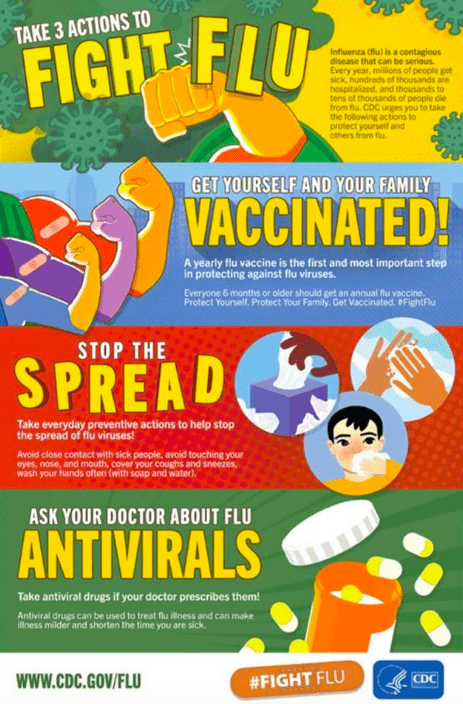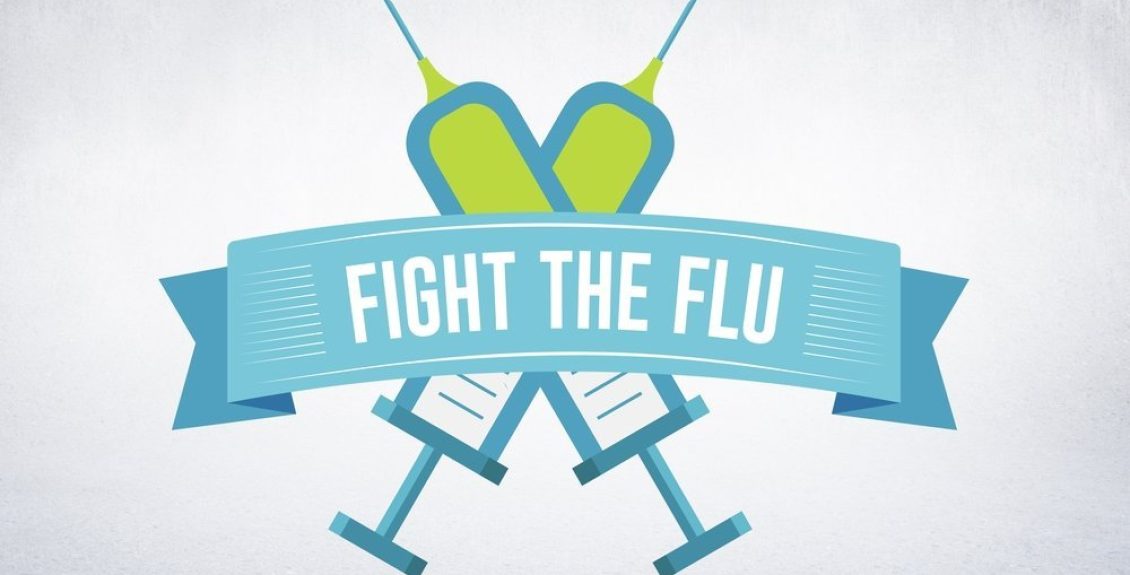Influenza is here! We want to ensure you know everything and anything about influenza, how to prevent it, and how to best treat this viral infection if your child comes down with it. The flu is often perceived as a mild sickness, although it can turn out to be much, much more. The best way to prevent this illness is to get a flu shot, but other measures can be taken. We know you care about the health of your kids and we do too!
Every year millions of people are affected by influenza. Most manage to fight it off, but in some cases, while your immune system is weak, the flu can lead to other deadlier diseases such as pneumonia and sepsis. This illness is a contagious respiratory illness that mainly causes fatigue, headaches, runny nose, congestion, cough, muscle aches, and a fever. People that have the flu are most contagious for the first four days of having been sick.
Scientists say it can spread from up to six feet away. It can travel through the air just from someone talking, and someone else could get the virus into their lungs. It also spreads by touching things that have been touched by someone who has the virus and then touching your eyes, nose, or mouth. Let’s face it, kids are not the best about washing their hands so things like the flu can spread quickly among them. If your child may have it, the best thing to do is to refrain from taking them anywhere into the public.
Get Vaccinated
There are many ways to prevent the flu, and many steps can be taken along with getting a shot. Obviously, the first step is to have a shot. We recommend that everyone 6 months and older should get one.
There are different types of flu shots, which one you get will depend on your age. A shot has many benefits. For example, for those with cardiac problems, a flu shot can lower the risk of problems associated with the heart. Women that are pregnant are more susceptible to the flu, getting a shot can reduce the chance of getting the flu by 50%!
Children are also more prone to the flu. Because they are young and their immune systems haven’t had time to fully develop, a flu shot can help protect them from influenza.
Millions of Americans receive a flu shot every year. Although a flu shot, like any vaccine, can have some side effects, it cannot give you the flu. If by chance you did not get a flu shot and happen to get the flu, many actions can be taken.

Stop The Spread
One action you can take is avoiding people who are sick as much as possible. This can help prevent your kids from getting sick. And if they are already sick, it will help stop them from spreading it to others.
You can also do this by making sure that whenever they cough or sneeze to cover their mouth with a tissue if possible, and immediately throw it away. Also, try to have them wash their hands as much as possible. Always try to clean surfaces that could collect the most germs, such as countertops, computers, and remotes. Lastly, try to help them avoid touching their eyes, mouth, and nose in general.
Ask About Antivirals
 Antiviral drugs are the best way to fight against the flu. They’ll lessen the time your kids are sick and make the symptoms a little more bearable. When you see them experience symptoms of the flu, you may need to come to see us and get them some medicine to accelerate the recovery process. Remember that this is not something to do instead of a flu shot. It is good secondary protection for your kids.
Antiviral drugs are the best way to fight against the flu. They’ll lessen the time your kids are sick and make the symptoms a little more bearable. When you see them experience symptoms of the flu, you may need to come to see us and get them some medicine to accelerate the recovery process. Remember that this is not something to do instead of a flu shot. It is good secondary protection for your kids.
The Centers for Disease Control and Prevention website offers 3 steps to take when you get sick. They are:
- Take Antiviral Drugs, if prescribed by a doctor.
- Take everyday precautions to protect others while sick.
- Stay home until you are better
Just like with the flu shot, there are many different types of antiviral drugs. Oseltamivir phosphate, or “Tamiflu” are offered in a pill or liquid, they are recommended for people 14 days or older. In powder form, Zanamivir or “Relenza” is best suited for those seven years or older. Peramivir is only offered from health care providers and can be used on everyone two years and older. Lastly, Baloxavir is just a pill that is used on kids a little older, 12 years or more. Always talk to your doctor about what and how much your kids should take.
Just 4 Kids Urgent Care
We hope this will help you understand influenza, the flu vaccination, and preventative measures to take. As always, please give us a call or come and see us if you have any questions about how to keep your kids healthy during the flu season.
